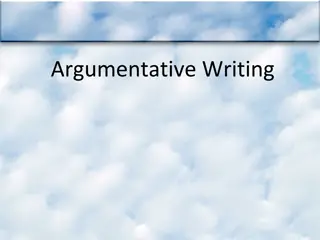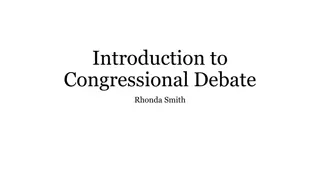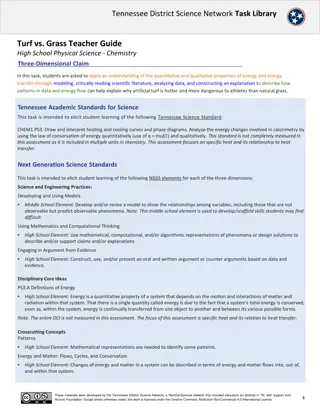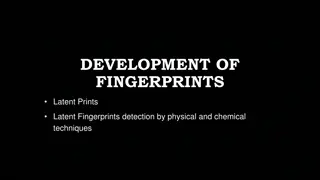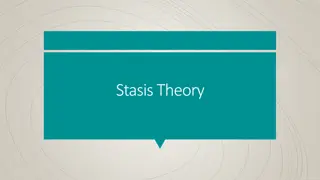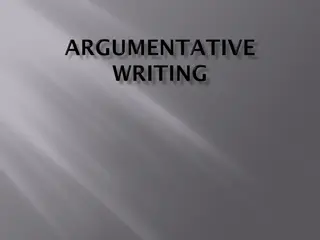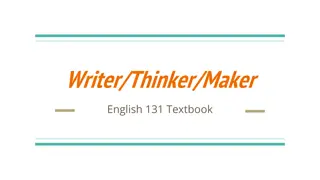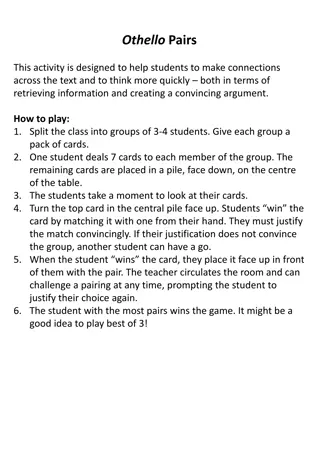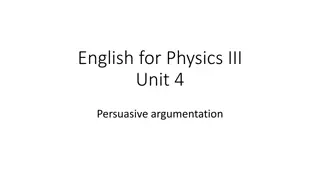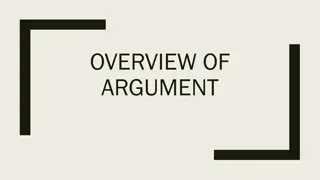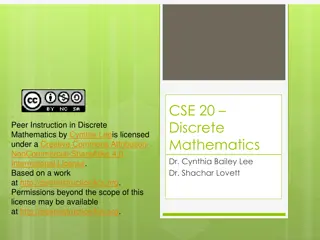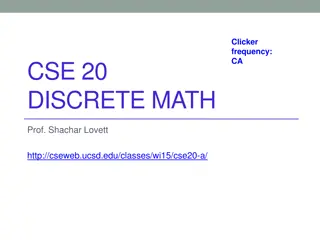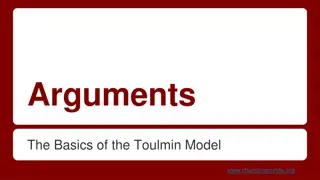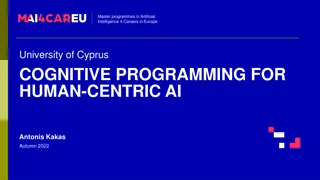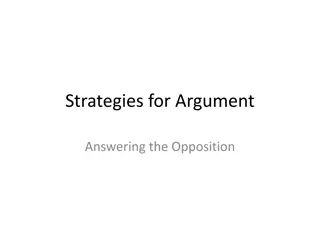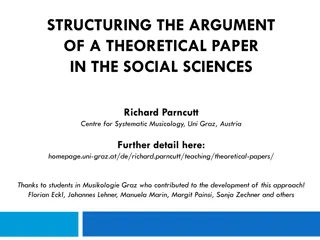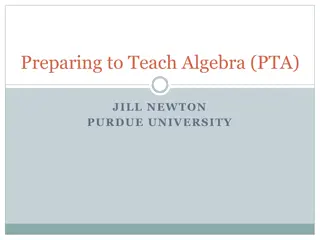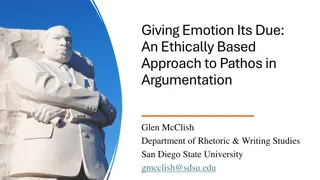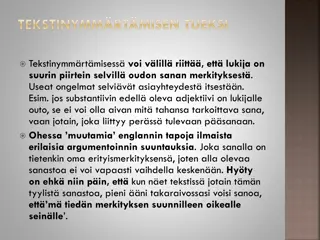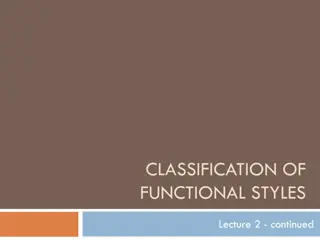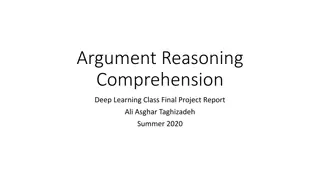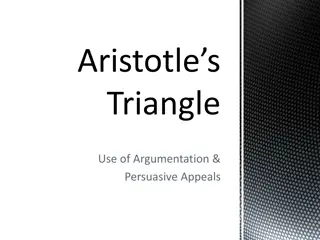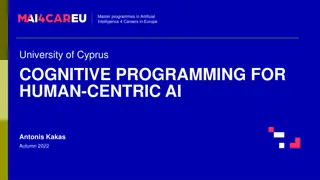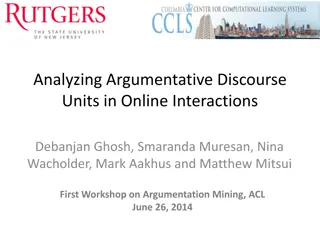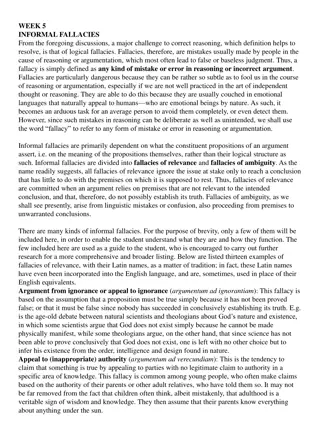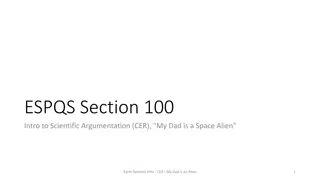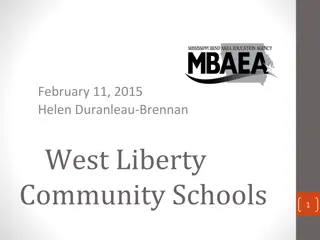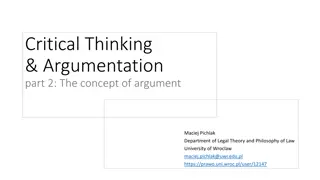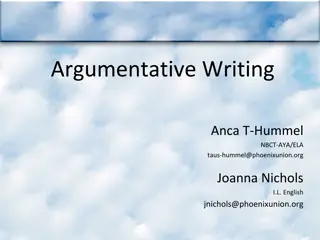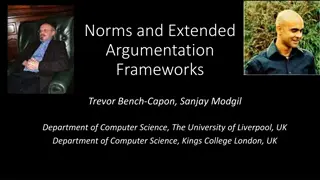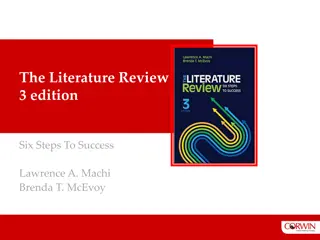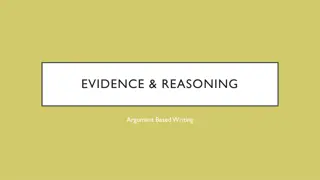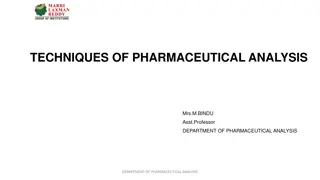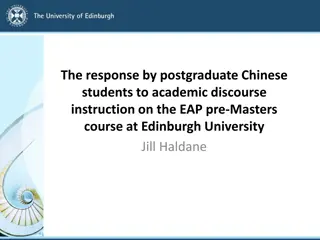Pedagogical Shift in Physical Science: Constructing Knowledge Through Learner-Centered Experiences
There is a significant pedagogical shift in physical science education from viewing science as a fixed body of knowledge to emphasizing the process of constructing knowledge. Learners are now placed at the center stage, engaging in inquiry-based learning, critical thinking, and collaborative interac
3 views • 21 slides
Mastering Argumentative Writing: Key Elements and Differences
Understanding argumentative writing essentials: from constructing a compelling argument to distinguishing between persuasion and argumentation. Learn how to effectively utilize claims, evidence, counterarguments, and refutations in crafting persuasive essays.
1 views • 32 slides
Essentials of Congressional Debate: Rules, Procedures, and Norms
Explore the key components of Congressional Debate including the types of legislation, preparation guidelines, contest norms, and dress code expectations. Learn about bills, resolutions, and constitutional amendments, and understand the importance of courteous behavior, proper attire, and effective
0 views • 27 slides
Understanding Energy Transfer through Turf vs. Grass Comparison
Students are tasked with analyzing energy transfer properties through modeling and data analysis to explain why artificial turf is hotter and riskier for athletes compared to natural grass. The task aligns with Tennessee Science Standards and Next Generation Science Standards, focusing on energy con
0 views • 16 slides
Understanding Fingerprint Development Techniques
Exploring the development of latent fingerprints through physical and chemical methods, conditions affecting latent prints, and various fingerprint development techniques like visual examination, powder techniques, and chemical techniques. Techniques such as alternate light sources and powder method
2 views • 22 slides
Understanding Stasis Theory in Argumentation
Stasis theory in argumentation helps identify the point of disagreement by categorizing issues into facts, definition, quality, and policy. It assists in framing debates and responses to opponents by asking questions about the nature, seriousness, and plan of action regarding the problem or issue at
1 views • 15 slides
Exploring the Political Philosophy of Hans Hoppe
Delve into the political philosophy of Hans Hoppe, a leading successor to Murray Rothbard, known for his contributions in argumentation ethics, criticism of democracy, and social evolution theory. Hoppe's work emphasizes the importance of property rights, rational discourse, and self-ownership in re
0 views • 20 slides
Effective Argumentation Framework for Persuasive Writing
This comprehensive guide outlines the key components of a strong argumentative essay, including claim, evidence, reasoning, counterclaim, and rebuttal. It emphasizes the importance of building a debatable and well-supported claim, providing reliable evidence, and utilizing logical reasoning. Additio
0 views • 9 slides
English 131 Textbook: A Comprehensive Guide to Writing, Reading, and Argumentation
This English 131 textbook is divided into six parts focusing on various aspects of writing, reading, and argumentation. It covers defining rhetoric, genre awareness, reading skills, conducting research, argumentation, and strategies for drafting and revising. The textbook provides tools and resource
0 views • 4 slides
Engaging Literary Connections Game: Othello Pairs
Facilitate student engagement and critical thinking with Othello Pairs, a card game designed to enhance text comprehension, information retrieval, and argumentation skills. Players match cards from their hand with a central pile card and justify their choices convincingly to win pairs and earn point
0 views • 10 slides
Exploring Energy Sources and Arguments in Physics III Unit 4
Delve into persuasive argumentation techniques with connectors like "despite," "although," and "even though" in English for Physics III. Practice constructing strong arguments and evaluating different perspectives on energy sources through discussions and listening exercises. Explore the effectivene
1 views • 32 slides
Understanding Argumentation: Exploring Explicit and Implicit Arguments
Argumentation is a creative and productive activity that involves critical thinking and inquiry, often in conversation with respected individuals. While argument may seem like a fight or quarrel to some, it is actually a process aimed at finding the best solutions to complex problems rather than jus
0 views • 13 slides
Understanding Fallacies in Argumentative Techniques
Dive into the world of fallacies in argumentation, exploring the nuances of Ethos, Pathos, Logos, and various rhetorical devices. Uncover the pitfalls of faulty Ethos and Pathos, dissecting examples such as Poisoning the Well and Appeal to Pity. Enhance your critical thinking skills by recognizing a
0 views • 16 slides
Understanding Direct Proofs in Discrete Mathematics
Explore the principles of direct proof in discrete mathematics through a Peer Instruction approach by Dr. Cynthia Bailey Lee and Dr. Shachar Lovett. Learn how to prove theorems of the form "if p, then q" using logical rules, algebra, and math laws. Utilize a clear template for direct proofs, practic
0 views • 17 slides
Guide to Direct Proofs in Discrete Math
Dive into the world of direct proofs in discrete math with this comprehensive guide. Learn how to prove implications, create truth tables, and follow a step-by-step direct proof template. Test your understanding with engaging quizzes and practical examples. Master the art of logical reasoning and fo
0 views • 18 slides
Understanding the Toulmin Model for Effective Argumentation
The Toulmin Model provides a structured approach to crafting and evaluating arguments, consisting of key components like claims, grounds/data, and warrants. It emphasizes the importance of using evidence and reasoning to support claims effectively. By understanding this model, one can enhance the pe
0 views • 13 slides
Understanding Argumentation and Realization in AI Master Programmes
Exploring the concept of argumentation and its realization in artificial intelligence master programmes, focusing on the construction, evaluation, and implementation of arguments through cognitive programming. The framework involves structured argumentation, conflict relations, and strength/preferen
1 views • 31 slides
Strategies for Answering Opposition in Argumentation
Utilize various strategies to effectively counter opposing viewpoints in arguments, including analogy, classification, comparison/contrast, definition, description, example, humor, narration, problem/solution, and reiteration. Analyze model arguments by summarizing claims, evaluating supporting poin
0 views • 15 slides
Structuring the Argument of a Theoretical Paper in Social Sciences
Explore the key components of structuring a theoretical paper in the social sciences, emphasizing critical thinking, clarity, and complex argumentation. Delve into examples from music psychology, discussing unclear questions and the main thesis focused on applying critical thinking principles to res
0 views • 47 slides
Exploring Algebraic Reasoning in Education Research
Delve into the journey of Preparing to Teach Algebra (PTA) with insights on research projects, challenges faced, and the development of frameworks and protocols. Discover the algebraic focus with justification and argumentation in educational settings. Learn about important concepts, implementation
0 views • 28 slides
Understanding Pathos in Argumentation: An Ethical Perspective
Pathos, as highlighted by Aristotle, plays a crucial role in argumentation by appealing to the emotions of the audience. While traditional views might view emotion as secondary to reason, a deeper insight reveals that emotion-based elements are essential for crafting powerful and ethically sound arg
0 views • 30 slides
Enhancing Text Comprehension with English Vocabulary
Understanding unfamiliar words can improve text comprehension. This article sheds light on nuances in English vocabulary, offering insights into different argumentation styles. It emphasizes the vastness of English language and the varying levels of vocabulary proficiency, encouraging enthusiasts to
0 views • 43 slides
Understanding the Publicistic Style in Writing
The publicistic style encompasses various forms of written and oral communication, such as newspaper articles, essays, and oratorical speeches. It aims to convince and persuade the audience through a combination of logical argumentation and emotional appeal. This style utilizes a wide range of vocab
0 views • 29 slides
Understanding Argumentation Mining in AI: A Deep Dive into Reasoning and Warrants
Delve into the realms of AI reasoning and argumentation mining, exploring the concepts of building models for logical decisions and extracting argumentative elements from text. Discover the significance of warrants in constructing compelling arguments within AI systems.
0 views • 19 slides
Understanding Aristotle's Communication Triangle: Logos, Pathos, Ethos
Explore Aristotle's Triangle of Argumentation and Persuasive Appeals, analyzing the role of logos, pathos, and ethos in effective communication. Discover how each element influences communication strategies, from rational reasoning and emotional appeals to ethical credibility.
0 views • 10 slides
Crafting a Strong Thesis Statement for Literary Analysis
Crafting a strong thesis statement is crucial for any literary analysis. A thesis statement comprises the writer's purpose and subtopics, with the writer's purpose being the specific point needing argumentation. This summary guides you through understanding the writer's purpose, creating an effectiv
0 views • 16 slides
Ethical Reasoning and Argumentation for Human-Centric AI
Delve into the philosophical basis of ethics in artificial intelligence, exploring levels of ethical reasoning and the importance of moral values and norms. Learn how argumentation serves as a vehicle for ethical decision-making, with practical examples and frameworks for ethical analysis.
0 views • 23 slides
Analyzing Argumentative Discourse Units in Online Interactions Workshop
This workshop delves into the analysis of argumentative discourse units in online interactions, emphasizing the segmentation, classification, and relation identification processes. It discusses challenges in annotation and proposes a two-tiered annotation scheme involving expert annotators and novic
0 views • 59 slides
Understanding Informal Fallacies: Common Logical Errors in Reasoning
Informal fallacies are mistakes in reasoning or argumentation that can lead to false judgments. They can be subtle and appeal to emotions, making them challenging to avoid. Fallacies of relevance and ambiguity are common types. Examples include argument from ignorance, appeal to authority, and appea
0 views • 5 slides
Exploring Alien Theories Through Scientific Argumentation
Delve into the intriguing concept of "My Dad is a Space Alien" through scientific argumentation and explanation. The Claim-Evidence-Reasoning (CER) framework is applied to analyze evidence such as weird language, unique diet habits, and possession of a spaceship, supporting the claim that the dad is
0 views • 13 slides
Enhancing Writing Skills through Iowa Core ELA Standards
Explore the session goals, learning targets, professional considerations, and literacy standards aimed at improving writing skills based on the Iowa Core ELA Standards. Discover the importance of argumentation writing, incorporating standards effectively, and fostering creativity through informative
0 views • 68 slides
Understanding the Concept of Argumentation and Critical Thinking
The concept of argumentation involves presenting and defending a series of connected statements to establish a proposition. This process aims to resolve differences of opinion by offering reasons and propositions that can be held accountable. Strong arguments have acceptable premises leading to a re
0 views • 17 slides
Mastering the Art of Argumentative Writing
Argumentative writing entails investigating a topic, evaluating evidence, and establishing a concise position. This type of essay requires a solid claim supported by logical reasoning and factual evidence. Learn the key components, the difference between persuasion and argumentation, and how to craf
0 views • 30 slides
Norms and Practical Reasoning Frameworks in Value-Based Argumentation
Norms play a crucial role in influencing behavior through practical reasoning. Practical reasoning involves using value-based argumentation frameworks to generate and evaluate arguments, as demonstrated in the parable of the Ant and the Grasshopper. The story highlights the importance of planning fo
0 views • 15 slides
Mastering the Literature Review Process: Essential Steps for Success
Understanding the essence of a literature review and its importance in academic research is crucial. This guidebook explores the key steps involved in conducting a literature review effectively, from defining the research topic to communicating and evaluating conclusions. It emphasizes critical thin
0 views • 13 slides
Effective Argumentation in Writing: Evidence and Reasoning
A comprehensive guide on utilizing evidence and reasoning in argument-based writing. Learn how to incorporate facts, quotes, and statistics from reliable sources to support claims, and how to analyze and explain the evidence to strengthen your arguments. Examples illustrate the importance of evidenc
0 views • 5 slides
Philosophy and Ethics A Level Overview: Religion, Ethics, and Christian Thought
This is an A Level overview of Philosophy and Ethics, focusing on topics such as Philosophy of Religion, Religious Ethics, and Developments in Christian thought. Students will explore concepts like the existence of God, moral issues, ethics, and more, challenging their intellectual capabilities and
0 views • 10 slides
Understanding Fingerprint Development Techniques
Latent fingerprints are hidden impressions left by the friction ridges of the skin which require physical or chemical techniques for visualization. Factors affecting latent prints include surface type, touch manner, weather, humidity, perspiration, and suspect care. Techniques such as visual examina
0 views • 22 slides
Analytical Techniques in Pharmaceutical Analysis
Analytical techniques play a crucial role in determining the identification and concentration of chemical substances in pharmaceutical analysis. Techniques range from simple gravimetric analysis to sophisticated methods using specialized instrumentation. Various techniques like gravimetric, titrimet
0 views • 17 slides
Academic Discourse Instruction for Postgraduate Chinese Students at Edinburgh University
The study explores the response of postgraduate Chinese students to academic discourse instruction in an EAP pre-Masters course at Edinburgh University. Various aspects such as effective academic writing, meta-discourse in persuasive writing, and concession relations in argumentation are analyzed. R
0 views • 25 slides

